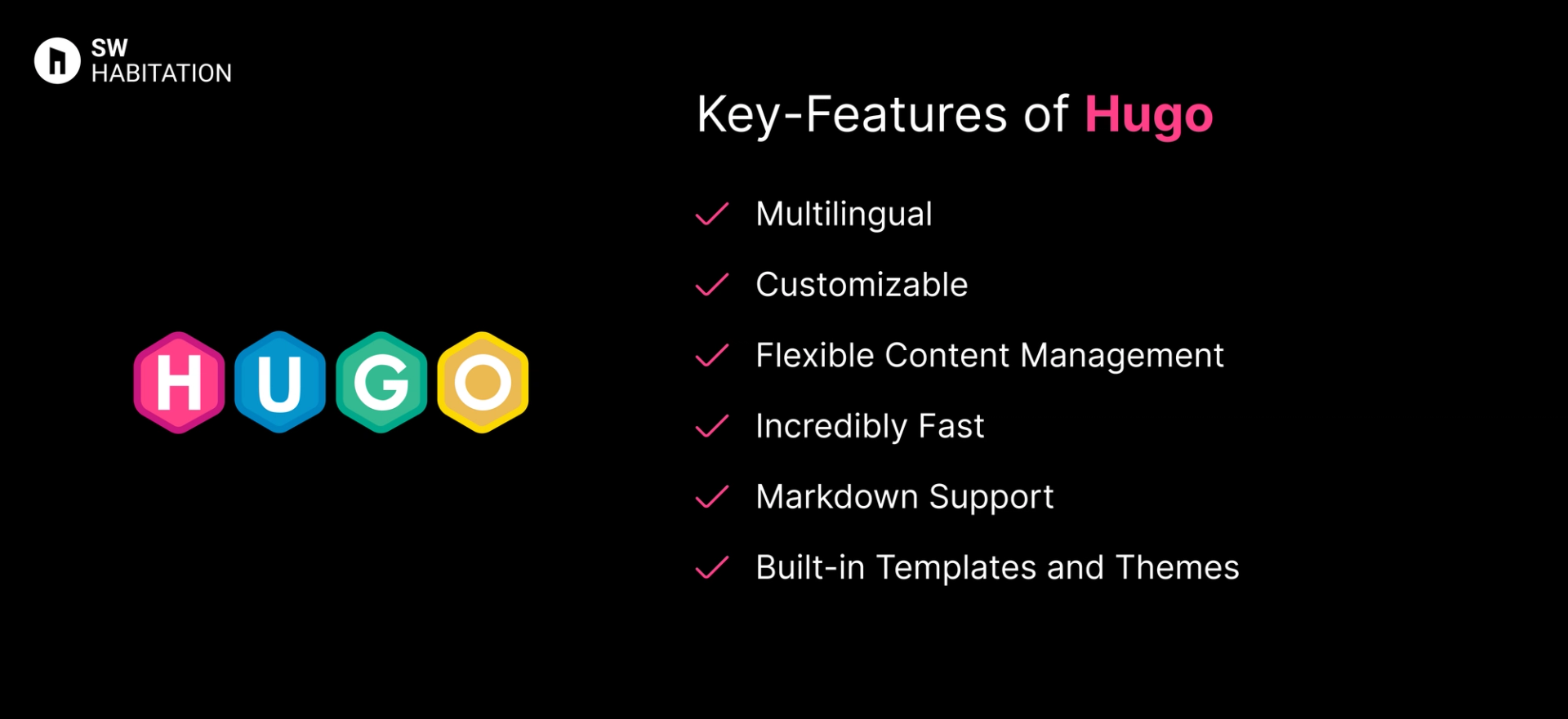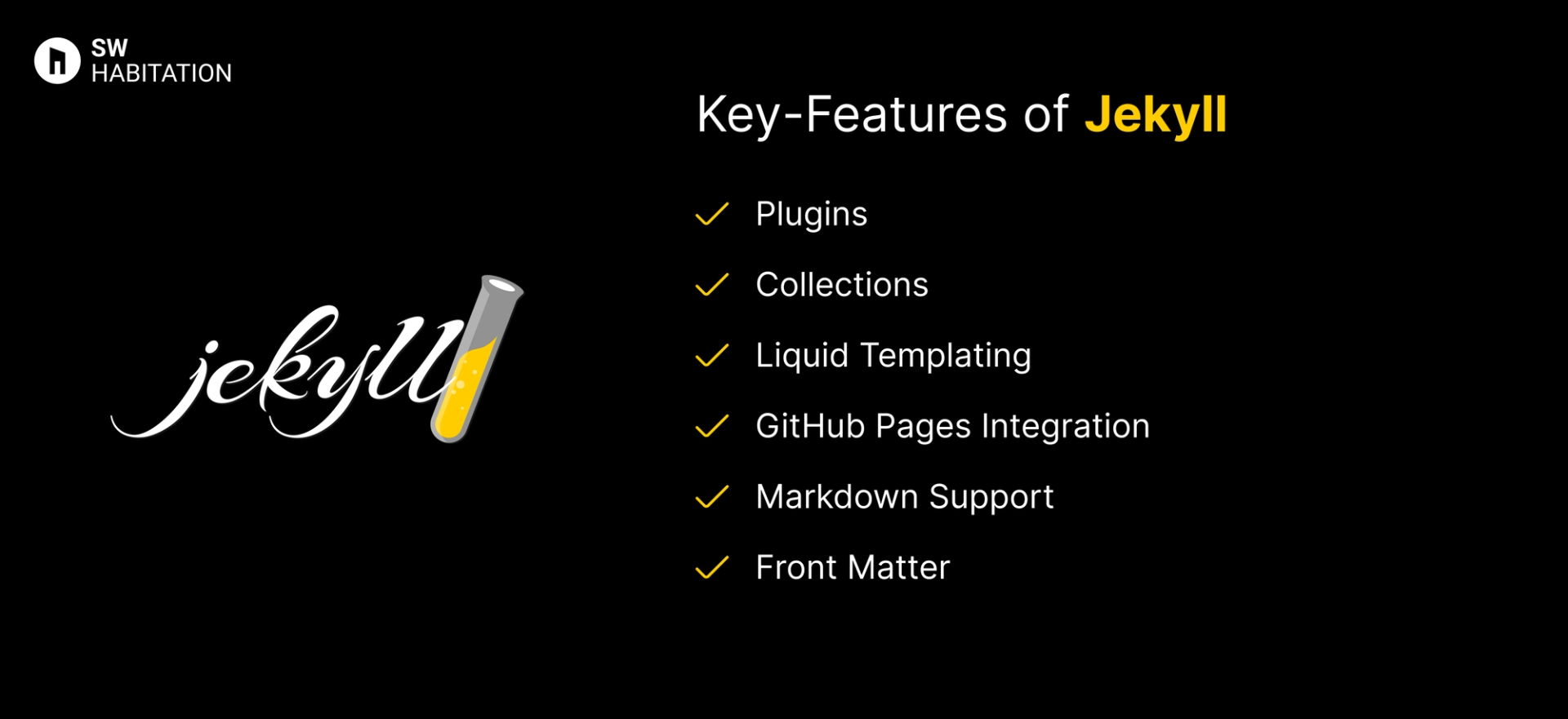Hugo vs. Jekyll

Hugo

Jekyll
Have you ever been to a website that loads super fast? Chances are it uses an SSG (Static Site Generator). It’s a tool that builds your site ahead of time, so when someone visits, they get the page instantly. No waiting around for things to load it’s just there.
What is Hugo?
Hugo is an open-source static site generator written in Go. It’s famous for its speed, being one of the fastest generators available, even with large websites.
Hugo uses Markdown files for content and allows you to customize your site with themes and templates. It’s simple, powerful, and perfect for those who want quick deployment with minimal setup.
Key Features of Hugo


- Multilingual: Easy setup for multi-language websites.
- Customizable: Plenty of configuration options to meet your needs.
- Flexible Content Management: Supports pages, posts, and taxonomies like tags and categories.
- Incredibly Fast: Hugo can generate thousands of pages in just a second.
- Markdown Support: Write in Markdown and Hugo will handle the rest.
- Built-in Templates and Themes: Use or create custom themes for fast and efficient development.
Advantages of Hugo
- Huge Community: With tons of themes, plugins, and community resources.
- Lightweight: Minimal dependencies required, which means less complexity.
- Full Flexibility: Create custom templates or use pre-built themes.
- Multilingual Sites: It’s a breeze to create websites in multiple languages.
- Super Speed: Hugo is one of the fastest static site generators available.
Disadvantages of Hugo
- Limited Plugins: While it has a good set, Hugo’s plugin ecosystem is not as huge as others like Gatsby.
- Requires Go Installation: You’ll need Go installed on your system, which could be a barrier for some users.
- Learning Curve for New Users: It can be challenging for beginners who aren’t familiar with the command line.
What is Jekyll?
Jekyll is an open-source static site generator built with Ruby. It takes your text files (written in Markdown), processes them through templates, and generates a static website that you can deploy anywhere.
No databases, no server-side scripting it just pure HTML, CSS, and JavaScript. It’s super popular among developers, especially for creating personal blogs and documentation sites.
Key Features of Jekyll


- Plugins: Extend functionality with a rich plugin ecosystem.
- Collections: Organize content beyond just posts and pages.
- Liquid Templating: Use Liquid, a simple templating language, to customize your site.
- GitHub Pages Integration: Seamless deployment on GitHub Pages.
- Markdown Support: Write content in Markdown, and Jekyll handles the rest.
- Front Matter: Easily add metadata like titles, tags, and layout options.
Advantages of Jekyll
- Highly Customizable: Tweak layouts, templates, and styles to make the site your own.
- Active Community: Tons of tutorials, plugins, and themes to explore.
- Simplicity: No database, no backend — just Markdown and templates.
- GitHub Pages Friendly: Direct integration with GitHub Pages means free hosting and automatic deployment.
- Perfect for Blogs: Designed with blogging in mind, making it easy to manage posts.
Disadvantages of Jekyll
- Build Times: For very large websites, build times can get a bit slow compared to newer tools.
- Limited Dynamic Content: Since it’s static, things like user authentication or live updates need extra work.
- Requires Ruby: You’ll need Ruby installed on your system, which can be a hurdle for some.
Comparison Between Hugo vs Jekyll
Use Cases of Hugo
- Fast Build Times: If you have a lot of pages, Hugo generates them at an incredibly fast rate.
- Static Websites: Ideal for creating portfolios, documentation, and landing pages.
- High-Performance Blogs: Perfect for personal and developer blogs with a lot of content.
- Multi-Language Websites: Easy to create and maintain multilingual sites.
Use Cases of Jekyll
- Portfolios: Showcase your work with a simple, fast, and customizable site.
- GitHub Projects: The perfect companion for project documentation hosted on GitHub.
- Documentation Sites: Clean, simple, and easy to organize docs.
- Personal Blogs: Its blogging-focused features make it a favorite for tech blogs.
Other Resources
Conclusion
Static Site Generators are a big game changer if you’re looking to build a website that’s fast, secure, and easy to maintain. Whether you’re launching a personal blog, portfolio, or a business website, they give you the freedom to focus on what really matters, your content and your users without all the extra complexity.
The best part? You’re not locked into one way of doing things. You can choose the tools and tech you’re most comfortable with, and scale things up as your site grows. From lightning-fast load times to better SEO and easy hosting, SSGs make the whole process smoother.
At the end of the day, it comes down to what fits your workflow and goals best. Pick the one that feels right to your requirements, and you’ll be well on your way to creating a beautiful, high-performing website that you’re proud of 🙌
Frequently asked questions
Is Hugo good for large websites?
Hugo is particularly well-suited for large-scale websites with many pages, such as documentation sites, portfolios, and blogs.
Can I customize Hugo themes?
Yes, Hugo comes with a large selection of themes, and they are highly customizable. You can modify them or create your own theme from scratch.
Does Hugo support multiple content types?
Yes, Hugo is highly flexible and supports multiple content types, including Markdown, JSON, YAML, and HTML, making it suitable for all kinds of content-driven websites.
What makes Hugo so fast?
Hugo is incredibly fast because it’s written in Go, a highly performant programming language. It can build websites in seconds, even if they have thousands of pages.
Is Jekyll easy to set up?
Yes, Jekyll is developer-friendly and has great documentation. However, it does require Ruby and some command-line usage to set up and deploy.
Can I host Jekyll on GitHub Pages?
Yes, Jekyll integrates seamlessly with GitHub Pages, allowing you to host your site for free directly from your GitHub repository.
Does Jekyll require a database?
No, Jekyll is file-based, meaning your content is stored as Markdown or HTML files. It compiles everything into static files, so there’s no need for a database.
What is Jekyll good for?
Jekyll is perfect for building blogs, documentation sites, portfolios, and personal websites. It’s highly optimized for Markdown and Liquid templating.
